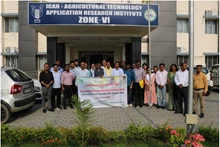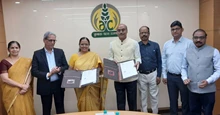
The Punjab Agricultural University (PAU) has achieved a significant milestone in agricultural innovation by successfully registering the biocontrol agent Trichoderma asperellum 2% WP with the Central Insecticides Board and Registration Committee (CIBRC). This development aims to address the persistent issue of Foot Rot or Bakane disease in Basmati rice, a crop of immense economic importance in the region.
Famous for its unique flavor and scent, basmati rice is an important part of India's agricultural sector and accounts for a substantial share of the global market. However, the increasing cultivation area has aggravated the challenges posed by diseases like Foot Rot, caused by the fungus Gibberella fujikuroi or Fusarium monoliforme. This disease has historically caused moderate to high losses on varieties such as Pusa basmati 1121 and Pusa basmati 1509, risking both yields and quality due to mycotoxin contamination.
Trichoderma asperellum emerges as an environmentally friendly solution to combat Bakane disease, offering a sustainable alternative to chemical pesticides known for leaving harmful residues. Its recent registration, sanctioned during the 455th CIBRC meeting on April 19, 2024, signifies a significant step toward eco-conscious agriculture. Now, farmers can effectively control Foot Rot and maintain environmental integrity by adding Trichoderma to seed and seedling treatments.
Dr. Satbir Singh Gosal, the Vice-Chancellor of PAU, commended the diligent efforts of the scientists involved in this breakthrough, underscoring their invaluable contribution to sustainable agricultural practices. " This is a tremendous step forward for sustainable agriculture in Punjab. I commend Dr. Daljeet Singh Buttar, Principal Plant Pathologist, and Dr. Narinder Singh, former Head of Plant Pathology, Department of Plant Pathology, PAU, Ludhiana for their relentless efforts in developing and registering Trichoderma asperellum as a solution for Bakane disease. Their commitment to advancing agricultural practices not only benefits our farmers but also safeguards our environment," Dr. Gosal remarked.
With the completion of registration procedures, the focus now shifts toward promoting widespread adoption of Trichoderma asperellum among farmers in Punjab. The development of this biocontrol agent for the management of foot rot signals an important development in rice farming techniques, bringing in a more sustainable strategy that lessens the need for chemical treatments. This transition ensures safer rice production, aligning with global standards for food safety and environmental conservation.
The momentum toward sustainable rice farming is increasing as more members of the agricultural community embrace this innovative approach, offering prosperity for both farmers and consumers.










